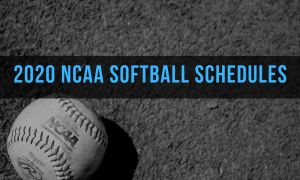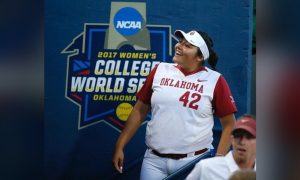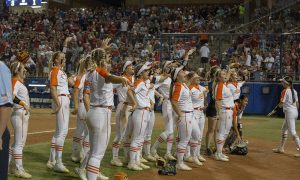Miranda Kramer Goes 7 Innings on Playing and Coaching Career with FPN
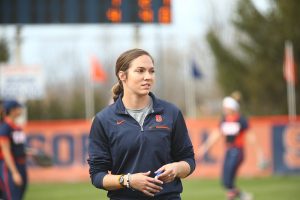
SU vs Binghamton (Photos by Michael J. Okoniewski-SU Athletic Communications)
On this latest edition of “7 Innings” we catch up with Syracuse assistant coach, Miranda Kramer, who was interim Head Coach of the Orange this past off season. Kramer is in her third year on the Orange staff.
Kramer was a standout at Western Kentucky where she was a top-26 finalist for USA Softball Player of the Year, Conference USA Newcomer of the Year, and Conference USA Pitcher of the Year. Kramer led Western Kentucky to NCAA Tournament in her senior season (2015) leading the nation in strikeouts, strikeouts per seven innings pitched, hits allowed per seven innings, and ranked second in shutouts. Kramer was drafted sixth overall in the National Pro Fastpitch (NPF) league by the Pennsylvania Rebellion where she played two seasons before concluding her professional career with the Scrap Yard Dawgs.
We catch up with Kramer who talked about her career at Western Kentucky as well as getting into coaching and working for new Orange Head Coach, Shannon Doepking.
Eric Lopez : What got you interested in going into college coaching?
Miranda Kramer : Just seeing how impactful a coach can be on athletes. I have experienced the good and bad in coaching, I had a staff in college that just wasn’t for me and I transferred out. I got a lot of offers and chose to stay loyal to Coach Tudor simply because of how much she impacted my life. How much impact my coach in college had on my life led me to make this decision of continuing on with this career. I want to give that to these kids – positively impact their life on and off the field, to make them see the good and always love this game and even on the “bad days” to be grateful to be able to even play this game with so much love because of what it has given us. Opportunity.
I absolutely love the moment when I am talking to a pitcher and it clicks, their face lights up and they get excited about it. It is something I look for daily in my kids here at Syracuse and it is almost as if it amazes them that they can do something so great. That feeling is indescribable and makes me love doing this every day. I feel like I have a lot of knowledge to give to these kids and you actually sit back after a year or two and realize how you’ve already been through what they have and how much you can relate, it would be a shame to waste that.
ELO : What is key in coaching pitchers in the college game and how is the transition?
Kramer : It’s a tough transition. It was for me when I got to college and it will be for many to come. There are so many different things. For me a big part is making sure my kids buy in to what I am doing here. This is not easy, it is not an easy position at all mentally and physically. At the end of the day you get the glory or you get the downfall as the pitcher. You could have a 20 strikeout 1-hitter but if that one hit is a walk off they aren’t asking where was the hitting, they are asking why did you give up that homerun, you know? It’s tough, it takes a mentally strong person to excel at this position. I try to tell my kids it’s a circle for a reason, the spotlight is there. The freshman tend to take a beating in the fall but their bounce back is unreal, it happened to me in college and it’s something I will never forget, but it shaped me into the pitcher I became and I will never be more grateful for that failure.
I think another big key is being able to relate to them, most of them feel like if they fail they are the first ones to do it. But reality is I failed a lot too, and it was a learning experience we just need to grow from. Every hitter in college is good, every one, you can never take a pitch off and if you do you pay the price but at the same time I tell my kids every inning that they are better than any batter that steps into that box. Missing an at bat is a lot easier than trying to hit a moving pitch and once they realize that you see a completely different pitcher. So I guess making them confident, is a huge key. Not to the point where they are arrogant but to a point where they believe they are the best. So I have five pitchers currently and if all five of my kids believe they are the best on my staff – that is a scary good staff – simply from helping them believe they are better than every batter.
ELO : What has the transition been like working with Coach Doepking?
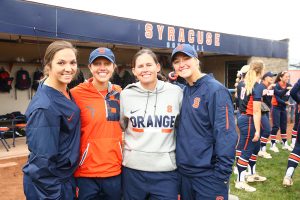
SU vs Albany (Photos by Michael J. Okoniewski-SU Athletic Communications)
Kramer : It has been really good. For about two months I was here alone and trying to deal with everything and it was extremely stressful, so having her here has helped me out a ton. She reminds me to take care of what needs to be done and not stress over it all which has helped me not only in coaching but in life as well, and for that I am so thankful. She has come in and made an immediate impact with our kids. Our team chemistry as whole has increased so much. I have learned so much in the last few months I would’ve never gotten an opportunity to learn had she not chosen Syracuse. She has in a way dug deep into our recruiting, what we are looking for, brought four very important core values to our program we live by on a daily basis. Coach has worked really hard to create great relationships with our kids in a short amount of time, as well as a good relationship with our staff and I can honestly say we are one cohesive group.
The biggest thing in all honesty is what she has been able to do for our program, I can’t tell y’all everything but I can tell you there are definitely some changes coming. Obviously being here the last two years with different coaches to now, to others it may not seem like an extreme change but there are definitely some major, good, and positive changes that have come to Syracuse and I am extremely thankful to Coach Doepking for that.
ELO : Have you had a chance to reflect on your playing career at Western Kentucky? How did you end up at WKU?
Kramer : Of course I have. It was a short year in my eyes, but I wouldn’t have changed a single thing, even how it ended. I ended up at WKU because my coach at IPFW, Coach Tudor, wanted to coach at her Alma Mater and got a great opportunity to go back. None of us could fault her for it, we just loved her as a coach so much we all just sat in the conference room and cried…my first thought was “I’m coming too!” I stayed my junior season because I wasn’t released and then in May after our season ended I called her right after I was granted my release and in August I was in Bowling Green, Kentucky.
I actually just went back to WKU a few weeks ago for Alumni Weekend, and it was so nostalgic, although I was only there for a year it was definitely the house that built me into who I am today as a coach and person. I would do just about anything to go back and relive that year. As for my career, I don’t think it ended how anyone imagined it would of course everyone wants to go to the World Series but my body just couldn’t get us there.
It was an unreal senior year, and many people don’t know but I had never thrown a no-hitter in college until I got to WKU, then I ended up with 3 and a perfect game. And when people ask me why it was so different than my other years, I don’t really have an answer other than I loved it at WKU and I had nothing to lose. I wanted to be the best and I wanted to win for my people, the other 7 seniors especially with how much they put into that program before we got there of all people they deserved it. One of my last moments with that team was one of my favorites, my time was done I was getting taken out and we all just sat in the circle sobbing because we knew it was our end together. It was one of my favorite moments because it showed me that in such a short time we had become so close I knew they would fight for me and I would absolutely break my arm for them, they stood by my side even when they didn’t know what I was capable of doing and that is what made that year so great to me. They were my family and home away from home.
ELO : What is your favorite moment as a player? How do you compare coaching in college to playing?
Kramer : My favorite moment as a player was any time a big win happened, I know that is cliché but our team was always considered an “underdog” team and no one expected us to do what we were capable of doing. I hated the way my career ended but the moment I threw my last collegiate pitch was one of my favorite moments. I remember going out of the game and talking to my infield, just the look on their face was obviously devastating because 4 of us were seniors, and my catcher was my best friend all through college. It was a moment of happiness for me, because in a short, very short, ten months we had all grown so close to know what that game had meant for each other. We as a senior class had a lot of ups and downs together but we all wanted the same end goal, and in that moment the real relationships I had with that team I knew was bigger than any win I could’ve wanted, it established my home.
Coaching in college is so much different than playing for obvious reasons. It can be frustrating as a coach to see an athlete do the same thing over and over without making an adjustment, where a lot of coaches tend to get frustrated I just put myself in their shoes. Something that comes easy to me doesn’t always come easy to my athletes and sometimes it does. I am sure there were times my coach would get beyond frustrated with me, in fact I know because she told me. I try to understand my pitchers one on one, they are all so different and unique that to one I can approach more stern with what I want and with others I have to ease off and let them figure it out. I am lucky enough that I can demonstrate some things for them and they can see it, but I can’t do things for them. That frustrates me, I want them to be better than I was so I want them to feel what it was like in my shoes going through college, so I try to simulate those things in their bullpens and relate it to an experience I have had or in terms to better understand what will help them.
ELO : If you were in charge of the sport of softball and you can change or add or take something away from the game. What would you do?
Kramer : This whole recruiting thing. I never played travel ball to this extreme it is now, I did for two years in high school, one year after I had committed. Of course Iowa High School Softball is a big deal and we play in the summer. I hear so many stories of people backing out of verbal’s and going on visits when they are committed to other programs and programs get mad, but no one is realizing that we verbal a kid when they are in 7th grade, of course they are going to freak out. I had no idea if I wanted to be a pitcher or not in 7th grade let alone where I wanted to go to school.
I think this new rule that was just implemented will help this a lot. A LOT. It just is a lot to expect from a child, basically to be so sure what they want in their life in 7th grade. It is just very extreme right now, I personally want these kids to play this game because they can’t live without it. Because they love the game with all their heart that they would rather be playing 50 softball games with their best friends than be on their phones and watching Netflix. So my last piece advice on this would to listen to your athletes, you will know if they love the game or not. Don’t push this on them, let them play because they love it and let them find their own way.
ELO: Describe your Pro career with Rebellion and Scrap Yard Dawgs.
Kramer : A dream come true. Just getting an opportunity to play after college was something I never expected, I mean I played at two mid-majors, one who no one has ever heard of. I remember I told Coach Tudor I would do anything to continue playing because I knew I wasn’t done yet. So just getting the opportunity to continue on my career was a dream come true. When Connie May called me to come to Scrap Yard, I had an opportunity to choose between two teams in the NPF and I went with my gut landing me on the Scrap Yard roster and with a huge ring on my finger at the end of the season.
One thing I focused on when I was in the NPF and even now is growing this game, I wanted little girls who never thought it was a possibility to have the emotions I got from this opportunity. When I decided to hang up my cleats I had a rush of emotions, I was unsure, we had lost my grandpa to hard fought battle with cancer, and I was kicking off my coaching career so it was so much going on and my only constant my whole life was being able to pitch. I went back and forth for about five months before it hit me that I will always have this game as a constant in my life, it will always be very much present not just from playing but through the relationships I created. The people I got the opportunity to play for and against was just unbelievable, a little Iowa girl never thought I would go toe to toe with Cat Osterman my first game ever in the pro league, play with Monica Abbott, pitch against Lauren Chamberlain, have Taylor Edwards as my catcher, there are so many amazing things that happened and I am forever grateful and blessed to say I was a part of it even if it was just for 3 years. What I am the most thankful for is the relationships off the field, some of my best friends came from the pro-league, Emma Johnson and Emily Weiman from my first year, Morgan Foley, Rachel Fox, and Cheridan Hawkins, Monica, Meagan, Taylor, Brittany, Liv, etc from my Scrap Yard season, Christian Stokes who still calls to see how my day was, Alisa Goler who helped me get to Syracuse in the first place, they are all so special to me and continue daily to be in my life. Even someone who I didn’t play with or play against, that I just met through another player from the NPF turned out to be my go-to person, a person who keeps me so grounded in everything I do. That is why it was so special to me, because those relationships are so rare and are second to none.
ELO : What going to be the key for Orange pitching staff and team to have success in 2019?
Kramer : Building. Working together. They have a good understanding that I hold them all to the same standard, not one of my pitchers is more important than the other. One thing I want is not just one great pitcher but a great pitching staff, and if one isn’t on board the other ones need to make sure that she gets there. I am thankful we have the fall because I have two returning kids in Alexa Romero and Miranda Hearn who know me, what I teach, are familiar with what work ethic I look for. I have two kids with college pitching experience in Logan Paul, a fifth year from Bryant who is in Grad School here, and Sophie Dandola who transferred to us over the summer from Hofstra. And one lone freshman in Peyton Schnackenberg
All my kids know that not one pitcher is going to do it all for our team. They work really well together and their personalities are just one of a kind. They know what will make us successful is buying into their role that is given to them, but also to do what they are called to do. Sophie needs Alexa just as much as Alexa needs Miranda and they all bring such different types of pitching to the table it makes this staff so unique.
Lastly, having a short memory I feel is important for any staff or just in this game in general. I learned the hard way that if you don’t have a short memory and take this game one pitch at a time it will eat you alive. So I stress with them that you can’t get a pitch back, so every pitch it’s all in and what happens, happens. One pitch at a time and then you’re on to the next one.

